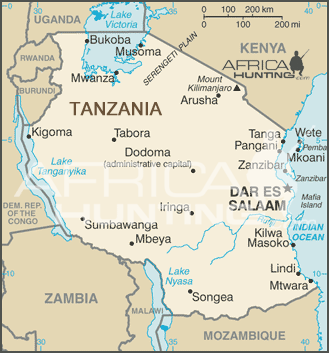- Joined
- Aug 21, 2009
- Messages
- 402
- Reaction score
- 159
- Website
- www.africanindaba.co.za
- Media
- 70
- Articles
- 182
- Member of
- CIC, Rowland Ward, B&C, DSC, German Hunting Association, KZN Hunting Association, Wild Sheep Foundation
- Hunted
- Western US, Western Canada, Alaska, Colombia, Tajikistan, Russian Federation, China, Iran, Austria, Germany, Spain, Czech Republic, UK, Indonesia, South Africa, Zambia, Zimbabwe, Congo, Tanzania, Uganda, Botswana, Namibia
Africa's Most Endangered Duiker Lives in Zanzibar
by Dr. Rolf D. Baldus

Aders duiker (Cephalophus adersi)
The United Republic of Tanzania has Africa's highest mountain, largest game reserve and rarest duiker. The latter is nothing to be proud of. We speak of the Zanzibar or Aders duiker (Cephalophus adersi), a small antelope of the duiker family, weighing 6 to 12 kg and standing about 70 cm in height at the shoulder. The body colour is a light reddish-brown. The head has a bushy tuft of hair surrounding the horns. Both sexes have little horns, but those of the males are bigger, measuring about 5 cm.

Map of Tanzania showing the Island of Zanzibar off of the coast.
The small antelope once was common at many places in Zanzibar. In a survey, Swai counted in 1983 approximately 5,000 Aders duiker on the island. In 1999 the number was down to 600 animals. Nowadays, it is restricted to a few forests along the east coast of Zanzibar. All are unprotected except the Jozani forest where less than 10% of the duikers occur. Today their number could well be under 300 animals. It is difficult to reach a conclusion about the size of a duiker population, as one cannot easily count them. The methods used are sample counts at night with torches, catching them in nets in sample areas or dung counts and then projecting their number over their whole range.
The Aders duiker also occurs in the Arabuko-Sokoke forest in Kilifi District in Kenya. It is safe to say that both populations together count less than a thousand animals. It is amazing that the same sub-species occurs on the Kenyan coast, but not along the Tanzanian coast opposite Zanzibar. Red duikers are very common there, but they seem to be the normal Natal Red or Harvey's duiker according to DNA analysis. However, it is still too early for conclusions, as our research is still ongoing.
Now the reader might be interested to see this animal, being one of the rarest in the world and living on our doorsteps. The best advice I can give is to do the same as the scientists normally do when they want to study this duiker: Go on one of the markets in Zanzibar and look at duiker carcasses which might be for sale and which will end up as stew or mishkake (something like an East African soesatie or kebab editor). The reason for the 90% population decline in two decades is killing the duikers for their meat. They are caught in nets together with the blue duiker and the little suni antelope, which share the forests and thickets with them. They are shot at night with shotguns in the light of torches. It is mainly traditional hunters from the villages nearby who conduct these hunts on their own or who join together in large driven hunts. Sometimes dogs are used too. There are also people from Zanzibar town who come by car on weekends, shoot the odd duiker at night and afterwards enjoy a barbecue on the beach. Some years ago it was reported that such honorable sportsmen killed about thirty duikers during just one weekend.
All efforts in the past to stop this bush meat hunting have failed although it is against the law. Asking the duiker experts does not help either, as they mainly propagate educating the people and outlawing hunting for bush meat. But the hunters in Zanzibar know that the duikers are vanishing, and that hunting them has been illegal for decades. A handful of duikers were translocated to Chumbe Island near Zanzibar town. This is a small privately run eco-resort, and the little animals are safe there.
In the near future the world's leading experts on small antelopes will gather for a conference on Chumbe. Many bright papers will be presented, the demise of the Aders duiker will be deplored, and the researchers will return to their study rooms afterwards.
It looks as if the extermination of this animal is only a matter of time quite obscene if one considers that the present meat value of the remaining duikers is probably not much more than 2.500 US$. However, without giving these animals a value, which can be turned into money without exterminating them, they certainly will not be saved from extinction.
Wildlife conservation on the island is solely the responsibility of the Government of Zanzibar. There might be hope, if somebody could convince the Government to take the issue seriously.
The Zanzibar duiker is part of the National Heritage as much as is the world-famous Stone Town. Upon a constructive stand of the Zanzibar Government, a programme to involve the communities into the conservation of the duiker could be started. The Tanzanian policy, to create Wildlife Management Areas in which the communities manage their game, conserve and use it for their own benefit, could serve as a model.
This policy is applied on the mainland why not in Zanzibar?
by Dr. Rolf D. Baldus
Aders duiker (Cephalophus adersi)
The United Republic of Tanzania has Africa's highest mountain, largest game reserve and rarest duiker. The latter is nothing to be proud of. We speak of the Zanzibar or Aders duiker (Cephalophus adersi), a small antelope of the duiker family, weighing 6 to 12 kg and standing about 70 cm in height at the shoulder. The body colour is a light reddish-brown. The head has a bushy tuft of hair surrounding the horns. Both sexes have little horns, but those of the males are bigger, measuring about 5 cm.

Map of Tanzania showing the Island of Zanzibar off of the coast.
The small antelope once was common at many places in Zanzibar. In a survey, Swai counted in 1983 approximately 5,000 Aders duiker on the island. In 1999 the number was down to 600 animals. Nowadays, it is restricted to a few forests along the east coast of Zanzibar. All are unprotected except the Jozani forest where less than 10% of the duikers occur. Today their number could well be under 300 animals. It is difficult to reach a conclusion about the size of a duiker population, as one cannot easily count them. The methods used are sample counts at night with torches, catching them in nets in sample areas or dung counts and then projecting their number over their whole range.
The Aders duiker also occurs in the Arabuko-Sokoke forest in Kilifi District in Kenya. It is safe to say that both populations together count less than a thousand animals. It is amazing that the same sub-species occurs on the Kenyan coast, but not along the Tanzanian coast opposite Zanzibar. Red duikers are very common there, but they seem to be the normal Natal Red or Harvey's duiker according to DNA analysis. However, it is still too early for conclusions, as our research is still ongoing.
Now the reader might be interested to see this animal, being one of the rarest in the world and living on our doorsteps. The best advice I can give is to do the same as the scientists normally do when they want to study this duiker: Go on one of the markets in Zanzibar and look at duiker carcasses which might be for sale and which will end up as stew or mishkake (something like an East African soesatie or kebab editor). The reason for the 90% population decline in two decades is killing the duikers for their meat. They are caught in nets together with the blue duiker and the little suni antelope, which share the forests and thickets with them. They are shot at night with shotguns in the light of torches. It is mainly traditional hunters from the villages nearby who conduct these hunts on their own or who join together in large driven hunts. Sometimes dogs are used too. There are also people from Zanzibar town who come by car on weekends, shoot the odd duiker at night and afterwards enjoy a barbecue on the beach. Some years ago it was reported that such honorable sportsmen killed about thirty duikers during just one weekend.
All efforts in the past to stop this bush meat hunting have failed although it is against the law. Asking the duiker experts does not help either, as they mainly propagate educating the people and outlawing hunting for bush meat. But the hunters in Zanzibar know that the duikers are vanishing, and that hunting them has been illegal for decades. A handful of duikers were translocated to Chumbe Island near Zanzibar town. This is a small privately run eco-resort, and the little animals are safe there.
In the near future the world's leading experts on small antelopes will gather for a conference on Chumbe. Many bright papers will be presented, the demise of the Aders duiker will be deplored, and the researchers will return to their study rooms afterwards.
It looks as if the extermination of this animal is only a matter of time quite obscene if one considers that the present meat value of the remaining duikers is probably not much more than 2.500 US$. However, without giving these animals a value, which can be turned into money without exterminating them, they certainly will not be saved from extinction.
Wildlife conservation on the island is solely the responsibility of the Government of Zanzibar. There might be hope, if somebody could convince the Government to take the issue seriously.
The Zanzibar duiker is part of the National Heritage as much as is the world-famous Stone Town. Upon a constructive stand of the Zanzibar Government, a programme to involve the communities into the conservation of the duiker could be started. The Tanzanian policy, to create Wildlife Management Areas in which the communities manage their game, conserve and use it for their own benefit, could serve as a model.
This policy is applied on the mainland why not in Zanzibar?
Last edited by a moderator:
